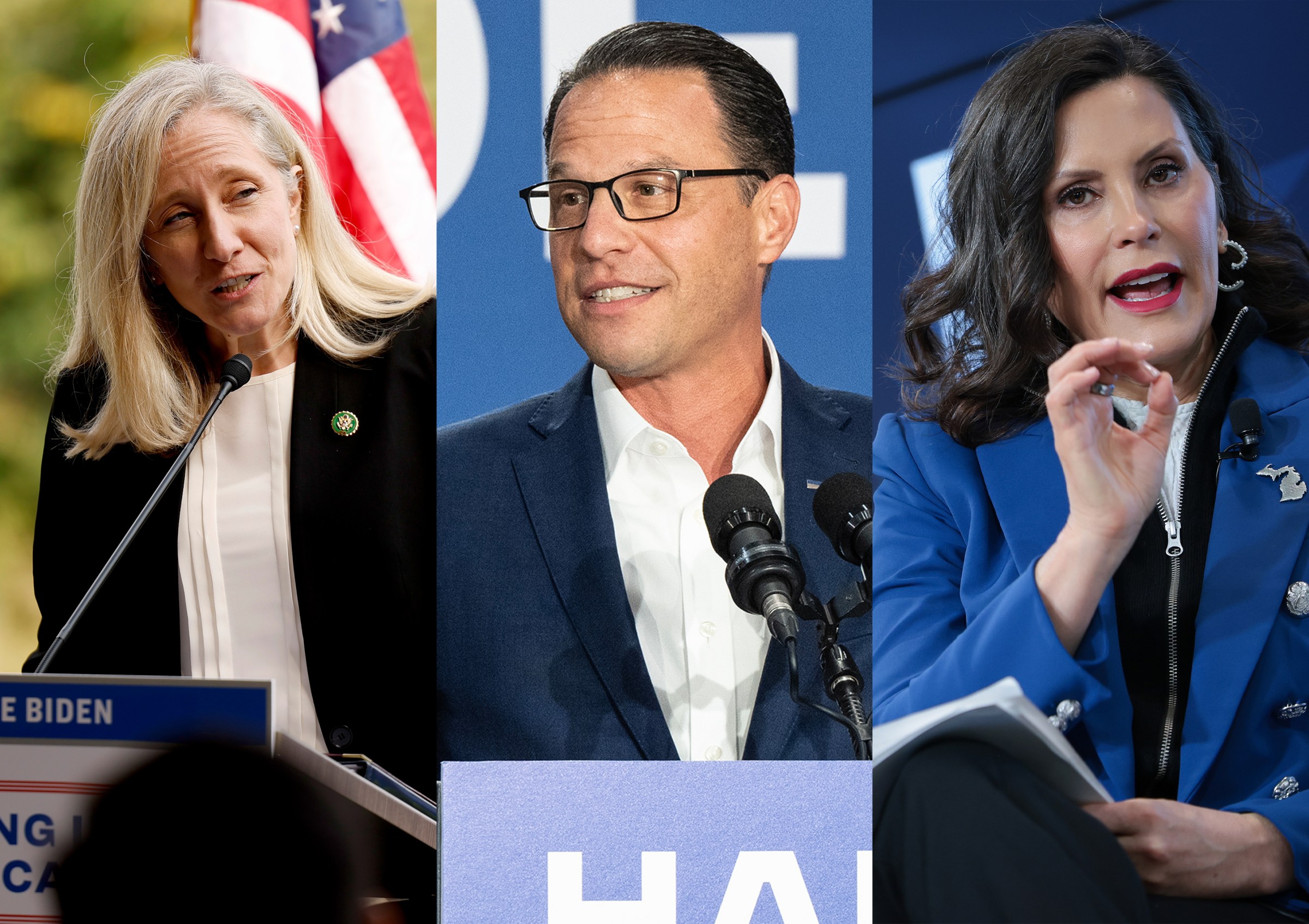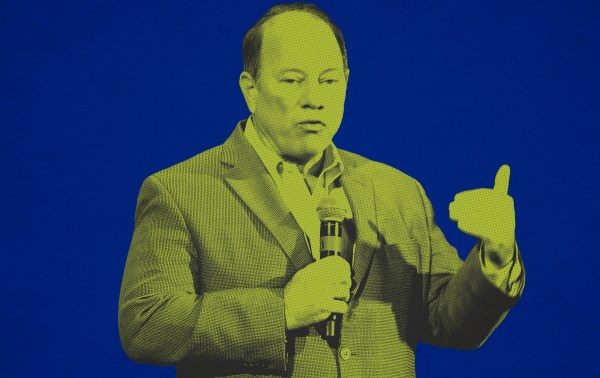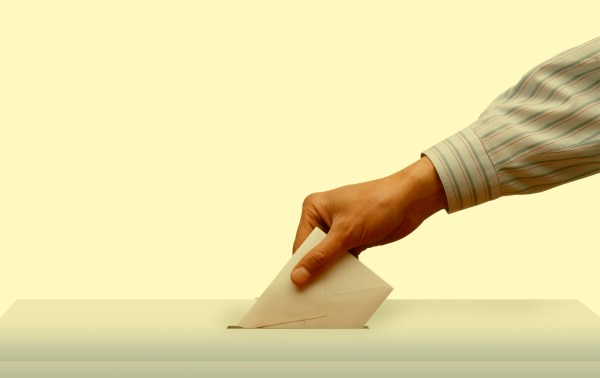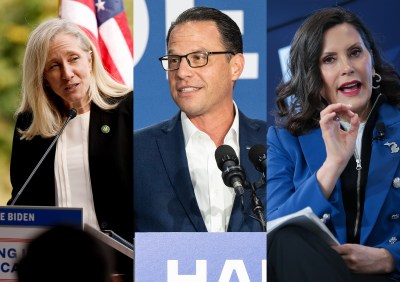Turn any article into a podcast. Upgrade now to start listening.
Premium Members can share articles with friends & family to bypass the paywall.
The Democratic Party is gingerly shedding its hostility to free trade, responding to voters who are growing suspicious of tariffs and pleading for relief from President Donald Trump’s inflationary import taxes.
Trade has always been a fraught issue for the party: Presidents Bill Clinton and Barack Obama championed and negotiated multilateral free-trade trade accords. But Democrats from Midwestern battleground states never warmed to pacts like the 1994 North American Free Trade Agreement with Canada and Mexico, or the Trans-Pacific Partnership negotiated with Asian nations in 2016 but abandoned under political pressure stoked by Trump during that year’s presidential campaign. Hillary Clinton, the 2016 Democratic nominee, even campaigned against the TPP. Like Trump, Democrats blamed such deals for the outsourcing of manufacturing jobs and hollowed-out working-class communities.
But nearly a decade later, Democrats in Congress—and those mulling a 2028 White House bid—are openly questioning the efficacy of tariffs.
Joined by swing-state voters, Democrats have concluded that broad-based tariffs like those Trump implemented in April work better in theory than in practice. Instead of improving economic conditions, taxes on imported commodities, food staples, and manufactured goods are driving up the cost of living and squeezing household budgets. And so Democrats are carefully countering the president by calling for a combination of robust free trade with American allies and deliberate tariffs that hit adversaries like China and protect key domestic industries—like semiconductor manufacturing.
“Trump’s across-the-board tariffs are the biggest tax increase on working families in modern history, raising the costs he promised to lower,” said Andrew Bates, a Democratic operative and White House aide under President Joe Biden who now advises the bipartisan Cost Coalition, during an interview with The Dispatch. “There are more strategic, limited ways to use tariffs that benefit our economy without increasing prices, like shielding key American industries when foreign governments subsidize their competition to drive U.S. companies out of business.”
Michigan Gov. Gretchen Whitmer, a Democrat and potential 2028 contender, made this argument in an op-ed she published Monday in the Washington Post. So did Pennsylvania Gov. Josh Shapiro, another Democrat on the party’s list of viable presidential candidates, in a late May interview with The Dispatch. (Even Trump seems to recognize the inflationary pressure tariffs are placing on goods and services. On Friday, the president reduced import taxes on bananas, beef, coffee, tomatoes, and other food items that dominate grocery lists and restaurant menus.)
More than simply making arguments, Democrats are starting to employ tariff-skeptical messaging in campaigns. Earlier this month, the Democrats who won key, off-year gubernatorial elections in New Jersey and Virginia both made Trump’s tariffs an issue—and ran against them.
“We focused on constituent stories,” Alex Ball, campaign manager for New Jersey Gov.-elect Mikie Sherrill, explained during a briefing hosted by the centrist-Democratic group Third Way, responding to a question from The Dispatch. “We were talking to folks at a coffee shop—or these small business owners had us in—and we talked about how your cup of coffee was going to get more expensive because it was that much more expensive for them to import those beans, so we kind of drew the daily-life comparison.”
Additionally, Ball said, the Sherrill campaign targeted New Jersey’s substantial Indian American community with tailored messaging focused on the damage Trump’s trade policies are doing to small businesses. Many Indian Americans in the state operate retail and grocery stores dependent upon imports. In Virginia, meanwhile, Gov.-elect Abigail Spanberger was critical of the president’s tariff regime in the context of its impact on the commonwealth’s agriculture industry. “We talked about tariffs and trade, especially as it pertained to injuring Virginia farmers,” Spanberger campaign manager Samson Signori said.
Some Democrats are more cautious than others as they dip their toe in free-trade waters that—since Trump’s first campaign for the Republican nomination nearly a decade ago—have been largely abandoned by both major political parties. Accordingly, Biden kept some of the tariffs Trump implemented during his first presidency.
Last week, while headlining a town hall meeting with voters in Overland Park, Kansas, hosted by the Democratic-aligned group VoteVets, Sen. Elissa Slotkin sharply criticized Trump for his handling of the economy.
The Michigan Democrat accused the president of failing to address affordability, an issue voters generally view as a crisis and rank as their No. 1 priority in most polls. Yet Slotkin, a potential 2028 presidential contender, never identified Trump’s use of tariffs as responsible for the inflation that has lingered since the Biden administration.
However, in an interview with The Dispatch afterward, Slotkin conceded she should have raised the issue.
“I should have talked more about tariffs, specifically—especially given my state,” said the senator, proceeding to make an affirmative case for tariffs when deployed properly; for instance, to preserve manufacturing sectors crucial for national security. “Just think about what’s happened in my state: We’ve just lost manufacturing jobs my entire adult life—especially since NAFTA, and people want those jobs back in the United States,” she said. “I’m very much open to a thoughtful, national security approach to trade.”
But Slotkin characterized the president’s tariff strategy as “pure slop,” based on “strange, back-of-the-envelope math,” that is both economically and geopolitically counterproductive. “In a very limited, precise way, we should be doing surgical tariffs when needed. But his approach is deeply wrongheaded,” she said.
This nuanced approach to trade might lack the political punch Democrats are hoping for, said Lakshya Jain, a data scientist who models voting behavior and has worked closely with Democratic-aligned groups. That’s because, however thoughtful and pragmatic, it doesn’t offer voters a clear contrast with Trump. Indeed, many Democrats appear to agree with the president in principle, arguing simply that they would be more effective at wielding his tariff strategy than he is.
“The party doesn’t really have one message,” Jain told The Dispatch. “There’s a lot of people in the Democratic Party who fundamentally agree with the idea of tariffs. They might not like Trump’s implementation of it, but they like the idea of tariffs. And it is really difficult to make the case that ‘I like tariffs, just not these tariffs.’”
Trump, in his 2016 campaign, blew up the Washington consensus that had looked kindly on free trade for decades.
His proposal for aggressive tariffs to rebalance trade relations with foreign countries and grow American manufacturing jobs—unorthodox for a Republican—was well-received by working-class voters who predominated in battleground states like Iowa, Ohio, Michigan, Pennsylvania, and Wisconsin. The result was that Trump flipped Iowa and Ohio into red states and became the first Republican in decades to win the so-called blue wall states of Michigan, Pennsylvania, and Wisconsin.
But Trump used tariffs only sparingly during his first presidency, while also renegotiating NAFTA into the United States-Mexico-Canada Agreement. It wasn’t until his current term that he followed through with campaign promises to levy blanket tariffs on goods from nearly every country on Earth. Trump insists his plan is working and that voters will begin to see the fruits of his policy in the first half of next year, despite the recent rollback of some tariffs.
But lingering inflation, which began under Biden and helped Trump win reelection last year, has caused voters to sour on the president, not to his broader trade agenda. In a November 18 Marquette University Law School poll, Trump’s job approval rating nationally for his handling of tariffs is an abysmal 37 percent, with 63 percent opposing. That’s a net-negative 26 percentage points. (The president’s job approval on his handling of inflation is even worse—35.6 percent in the RealClearPolitics average of recent surveys.)
For the first time in a decade, that is translating into voters rethinking their fondness for tariffs and Trump’s trade strategy, said Paul Sracic, an adjunct fellow at the conservative Hudson Institute. Sracic would know. He spent years teaching political science at Youngstown State University in eastern Ohio, ground zero for voters’ rejection of NAFTA and their affection for Trump and his hawkish trade policies. He’s observed this phenomenon firsthand.
“I’ve lived in the Midwest for over 30 years, and this is the first time I have ever heard average people talk in a negative way about tariffs. That could open a narrow window for a savvy Democratic candidate to push back against Republican trade policy—provided they do it carefully,” Sracic told The Dispatch, although he added: “Openly embracing ‘free trade’ is still electoral suicide in the region, so any critique has to be subtle.”







Please note that we at The Dispatch hold ourselves, our work, and our commenters to a higher standard than other places on the internet. We welcome comments that foster genuine debate or discussion—including comments critical of us or our work—but responses that include ad hominem attacks on fellow Dispatch members or are intended to stoke fear and anger may be moderated.
With your membership, you only have the ability to comment on The Morning Dispatch articles. Consider upgrading to join the conversation everywhere.